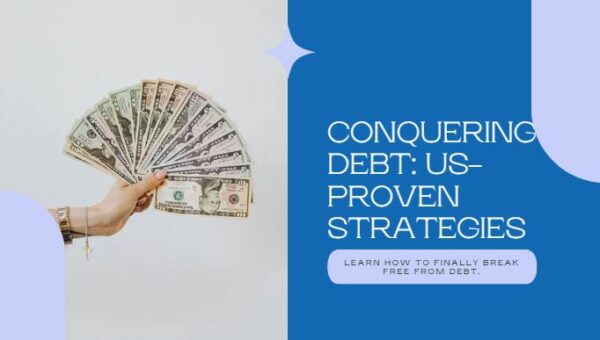Debt can feel like a giant weight on your shoulders, dragging you down and holding you back from achieving your financial goals.
But fear not! With the right strategies and a little determination, you can conquer your debt and pave the way to financial freedom.
In this article, we’ll explore some proven strategies for paying off debt in the United States, along with official resources to help you along the way.

Understanding Debt
Before we delve into strategies for paying off debt, let’s first understand what debt is and how it can impact your financial health.
Debt is money that you owe to lenders or creditors. It can come in various forms, such as credit card debt, student loans, mortgages, car loans, and personal loans.
While some debt can be beneficial, such as a mortgage for buying a home, too much debt can lead to financial stress and hardship.
Creating a Debt Repayment Plan
Now that you see your debt mountain, it’s time to develop a strategy to climb it. Here are some popular methods:
- The Avalanche Method: This strategy focuses on paying off the debt with the highest interest rate first. By eliminating high-interest debts quickly, you save money in the long run.
- The Snowball Method: This method prioritizes paying off the debt with the smallest balance first. Seeing debts disappear quickly can be motivating and keep you on track.
- Debt Consolidation: This involves combining multiple debts into a single loan, ideally with a lower interest rate. This simplifies your repayment process and potentially saves money.
The Consequences of Debt
Carrying a heavy debt burden can have several negative consequences:
- High-Interest Payments: Most debt comes with interest, which means you end up paying more than the original amount borrowed.
- Damage to Credit Score: Missing payments or carrying high levels of debt can lower your credit score, making it harder to qualify for loans or obtain favorable interest rates in the future.
- Stress and Anxiety: Living with debt can cause stress and anxiety, affecting your overall well-being and mental health.
- Limited Financial Freedom: Debt can restrict your ability to save, invest, and pursue your financial goals.
Now that we understand the challenges associated with debt, let’s explore some strategies for paying it off.
- Create a Budget: Start by evaluating your income and expenses to create a realistic budget. Identify areas where you can cut back on spending and allocate more money toward debt repayment.
- Prioritize High-Interest Debt: Make a list of all your debts, prioritizing those with the highest interest rates. By focusing on paying off high-interest debt first, you can save money on interest payments in the long run.
- Use the Debt Snowball or Avalanche Method: Two popular debt repayment methods are the snowball and avalanche methods. With the snowball method, you pay off your smallest debts first, then roll the payments into larger debts. The avalanche method involves tackling debts with the highest interest rates first.
- Increase Income: Consider finding ways to increase your income, such as taking on a part-time job, freelancing, or selling unused items. Applying extra money toward debt repayment can accelerate your progress.
- Negotiate with Creditors: Don’t hesitate to reach out to your creditors to negotiate lower interest rates or payment plans. Many creditors are willing to work with borrowers who are proactive about repaying their debts.
- Seek Financial Counseling: If you’re feeling overwhelmed by debt, consider seeking help from a reputable credit counseling agency. They can provide personalized advice and assistance in developing a debt repayment plan.
Tips to Power Up Your Debt Repayment
- Increase Your Income: Explore ways to make extra money, like a side hustle or a part-time job. Every additional dollar earned goes towards conquering your debt.
- Trim Your Expenses: Analyze your spending habits and identify areas to cut back. Consider budgeting apps or creating a spending plan to track your expenses.
- Renegotiate Interest Rates: Contact your credit card companies and ask for a lower interest rate, especially if you have a good payment history.
- Avoid New Debt: While tackling existing debt, resist the urge to take on new loans or credit card purchases. Focus on putting every extra penny towards your debt repayment plan.
Official Resources
The United States government offers various resources and programs to help individuals manage and repay their debts.
- Federal Trade Commission (FTC): The FTC offers resources on consumer rights and debt management. Visit their website for tips on dealing with debt collectors and avoiding scams: FTC Debt Collection Information
- Consumer Financial Protection Bureau (CFPB): The CFPB provides tools and resources to help consumers make informed financial decisions. Their website offers guides on managing debt and dealing with financial challenges: CFPB Debt Collection Resources
- U.S. Department of Housing and Urban Development (HUD): HUD offers housing counseling services, including assistance with foreclosure prevention and mortgage delinquency. If you’re struggling with housing-related debt, HUD-approved counselors can provide guidance: HUD Housing Counseling
Conclusion
Conquering debt requires discipline, determination, and the right strategies. By creating a budget, prioritizing high-interest debt, and exploring resources available from government agencies, you can take control of your finances and work toward a debt-free future.
